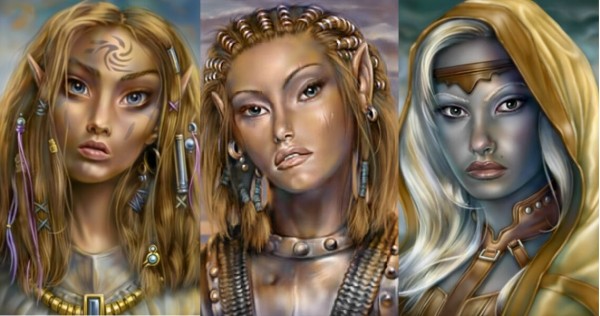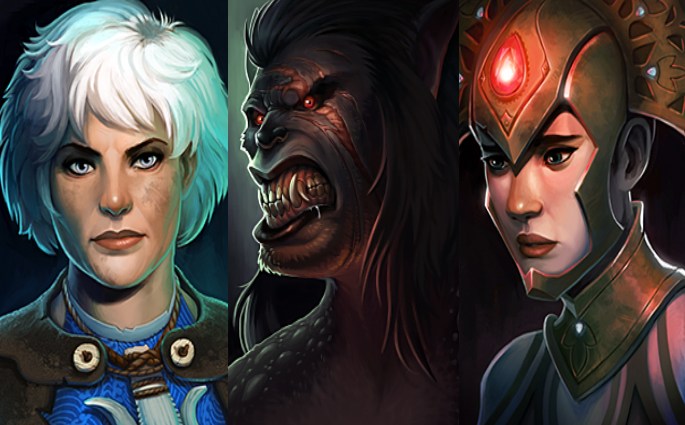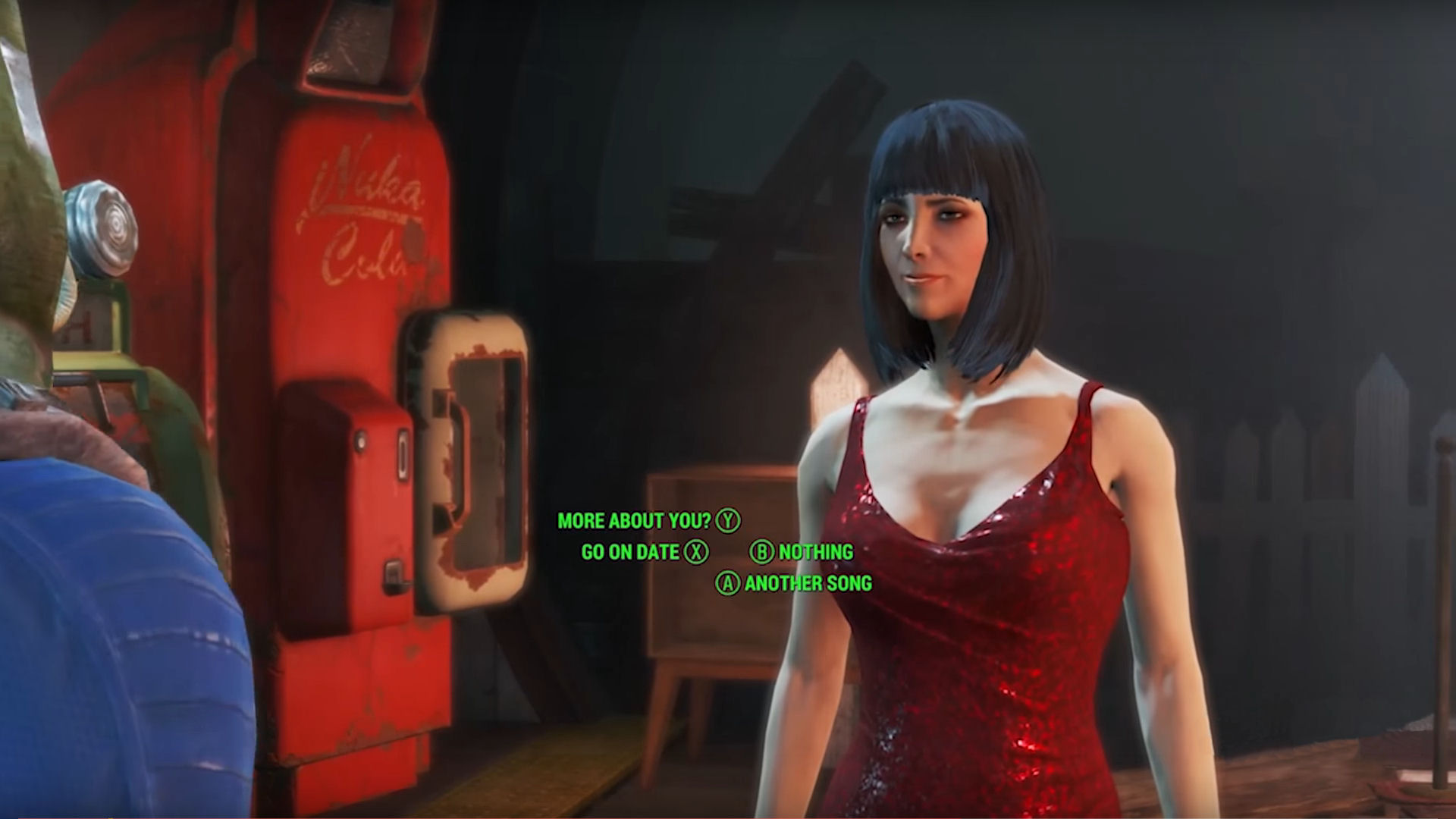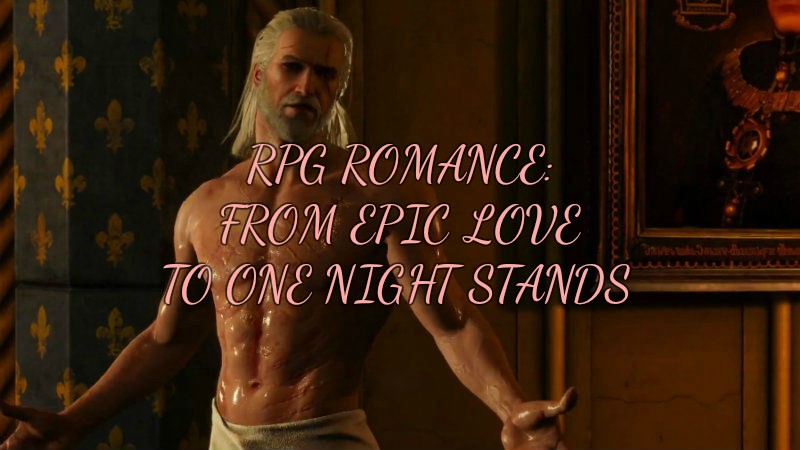Spring is almost here, restaurant reservations are getting snatched up like crazy, and the Witcher sex scenes all strung together on YouTube are racking up the hits. So, it must be nearly Valentine’s Day!
Although it wasn’t always so, romancing your party members has become a staple of the RPG genre, particularly due to Bioware. As western RPGs become more prevalent, the ability to take your relationships with party members in romantic directions has essentially become standard — although that practice may be coming to an end.
While in many ways these modern RPG romances are more advanced than they were in the past (particularly on the graphical front), in others, they’ve actually devolved. All too frequently nuanced portrayals of interactions between budding lovers that take time to develop naturally are replaced by guessing which dialog option will get to the bumping and grinding the fastest.
Where We Were
If I had to name one classic RPG that most exemplifies the idea of inter-party romance, Baldur’s Gate II would easily be the first title that comes to mind. The idea was still fairly new to North American audiences at the time — and the options available for the Bhaalspawn were limited — but the romances created in that context were both incredibly memorable and incredibly time consuming.
Unlike with the instant gratification of newer games where you click the dialog option that lets you see if you’ve progressed far enough for a new relationship segment, Baldur’s Gate II made you wait for anything to happen. It could literally take weeks — even months — to get anywhere with Jaheira while waiting for her to approach you again during a camping scene.
What most stands out about the relationships in this game are the radically different personalities and situations that we don’t see as much of today. Jaheira, for instance, is a widow, and you were friends with her deceased husband, taking relationship conversations a much different direction than in current Bioware-type fare.
In a reverse of the typical options noawadays, you could actually “lose” the romance with Aerie by agreeing to have sex with her the first time she brings it up, with the relationship crashing and burning from that point on. But if you held off and said no, eventually you would be bound together and even have children.
The romance dialog also tended to make you think about real-world events within a fantasy context: Is it OK to bring a pregnant woman along for a combat mission? Am I crossing a line with a woman whose husband was one of my mentors and close friends?
Of course, while long-time RPG fans can get all nostalgic about the romance options from those earlier days, they definitely weren’t perfect. Artificial limitations were present on who could be romanced in ways that didn’t always make sense or weren’t inclusive.
The race and gender lineup in Baldur’s Gate II was entirely focused towards straight male gamers, with three female and one male companion options available. Most notably, all three romance options for a male player character are beatiful elvish women. I guess gnomes and half-orcs just don’t have feelings or something?
 The dating pool in Amn
The dating pool in Amn
Looking back now, there were also some odd connotations in how the D&D morality system intertwined with sexuality. Viconia — a neutral evil drow — wanted to have lots of sex. Aerie — a lawful good cleric — wanted very little.
That’s one way in which more modern games have definitely progressed to a realistic (and less offensive) stance, coming to the conclusion that sexuality is a characteristic shared by essentially all people, regardless of how they behave or what background they come from.
Where We Are
The one-night stand is a hallowed tradition in the Witcher series, where brothels and fiery haired sorceresses are abundant. But even in that setting there’s some genuinely touching moments between Geralt and his various lady loves.
On the other side of that spectrum is the typical Bioware romance, where “dating” consists of saying something a person agrees with, giving them some gifts, doing the nasty, and then not talking about the relationship ever again because you finished the sub-plot.
This whole notion of romance and marriage in the RPG genre was (perhaps rightfully) mocked in the Fable series, since you could have as many children as you wanted with as many spouses as possible. Then you could orphan them or put them up for adoption. Dating was thoroughly lampooned in the second and third Fable games, where you could literally fart at someone, offer them a ring, and then get hitched that day.
 A story as old as time: I charmed her with the belch expression!
A story as old as time: I charmed her with the belch expression!
With romance of course comes the possibility of children, an idea that’s been spreading across the RPG universe and is a concept that should be covered in gaming more than just in joke titles like Who’s Your Daddy. Sadly, when it is covered, parenthood does frequently get dumbed down.
Much like the rest of the hyper-casual Skyrim for instance, adopting a child had all the effort taken out of it and took hand-holding to the next level. Upon entering Whiterun, a kid literally walks up and immediately asks you to adopt them if you’re nice enough to spare a gold piece. I distinctly remember laughing out loud and staring dumbfounded at the screen the first time that happened.
Bethesda might have mastered creating huge worlds in the latest Elder Scrolls and Fallout games, but they sure need to work on having players care about anything going on within them.
That lazy approach has seeped into interactions between party members in the RPG realm, with this on-point meme practically explaining all dialog conversations between party members who have the possibility of being attracted to one another:

Even if the romances themselves aren’t as compelling, the options available have easily increased and improved since the olden days of yore, with many developers taking a socially conscious and inclusive approach.
In most cases that’s a good thing, but in a few we arrived at unintentional absurdity. I’m looking at you Zevran. While I’m sure someone out there could write a compelling story of love between a male dwarf and a male elf – there’s got to be somebody with some smutty Gimli / Legolas fan fiction worth reading – but sadly in Dragon Age it became a punch line.
Whether its the over-the-top stereotypical romance music or the odd shirtless animations while Zevran lovingly holds an exiled dwarf noble, this is a sex scene that is going to illicit more giggles than gasps.
When Romance Isn’t Needed
There’s been some good and some bad as RPG romances evolve and continue to be utilized in newer games, but there’s one option many developers are now considering: maybe it isn’t needed at all.
Featuring some truly legendary developers and writers who were involved with classic Infinity Engine games, Obsidian broke with tradition and brought no romances at all in either the archetypical Pillars Of Eternity or the good-to-be-bad Tyranny.
That’s a move that didn’t sit well with the fan base, and even today – months after Tyranny’s release and years after Pillars – you can still find dozens of Steam discussion topics lamenting the lack of romances with characters like Verse or Sirin.
Here I’m going to have to break with those mounting voices: I think Obsidian made the right call in the case of Tyranny, as romances aren’t right for that setting, and I don’t just mean because you are playing on the side of evil.
 Now there’s a diverse dating pool…
Now there’s a diverse dating pool…
In Tyranny, you take on the role of a character directly in charge of your subordinate companions during a military conquest. Whether a soldier under your command, a prisoner of war forced to work for you, or a sage who doesn’t enjoy violence but needs to chronicle history, your party members are frequently forced to do things they don’t want to do.
Since you have the power of an evil goddess backing you up, those companions have no choice but to acquiesce – or you’ll kill them. Party members fearing you is even directly built into the game mechanics, with new powers unlocked when you hit certain tiers after doing horrible things to terrify your lackeys.
Call me an SJW all you’d like, but any attempt at “romance” in such a scenario would be more than a little rapey.
 Now that you’re terrified of me… wanna have sex?
Now that you’re terrified of me… wanna have sex?
Where Romance Needs To Go
It seems entirely possible that the age of RPG romances might be ending, with developers like Obsidian avoiding them entirely lately and their tropes becoming overplayed and predictable in the latest Bioware or Bethesda entries.
If they are around to stay however, some serious overhauls to the concept of an RPG romance are clearly in order. Although this will take more effort on the part of the developers and writers, it would be a blessed to change to see less guessing what a party member wants to hear, and more attracting partners by being yourself (which I suppose is an odd concept, since by definition in an RPG you are being someone else).
Outside the dialog option system where you get someone to like you, romances are in drastic need of expansion to their ultimate conclusions. For instance, what happens when you have a nasty break up, but then still have to adventure together to save the world?
Most romantic relationships eventually end rather than continuing indefinitely, yet that isn’t born out the typical RPG. How would dialog options and perhaps even story arcs change if it turns out the party’s healer actually can’t stand Conan anymore after a few months of sharing his bedroll?
A greater depth of ways to behave within a relationship is also sorely lacking. Imagine a more realistic and expanded system – what if the main character of an RPG decides to romance multiple people at once and has to make a decision between them? Where’s the option to cheat? There’s tons of story material ripe for the picking there with storyline repercussions and party schisms based on whether the infidelity is ever discovered.
Unexpected ends to romances are also usually missing, with dying spouses or your romanced companion leaving you for another character both entirely missing from the RPG romance paradigm.
 Oh, this dress isn’t for you, it’s for Nick. Turns out I’m into synths.
Oh, this dress isn’t for you, it’s for Nick. Turns out I’m into synths.
What do you think of the state of RPG romances these days? Do you feel they are an integral part of the experience that would be missed, or is it time for a serious overhaul as they’ve gotten stale?







Published: Feb 3, 2017 08:56 pm